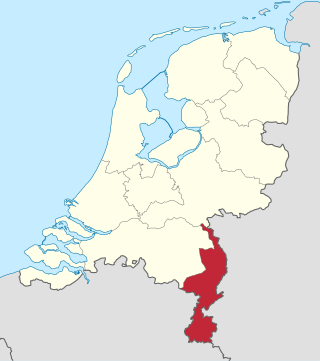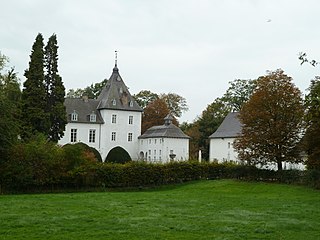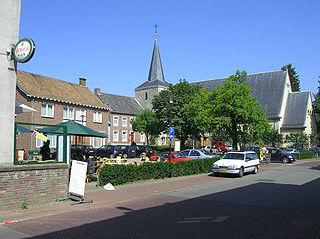
Limburg, also known as Dutch Limburg, is the southernmost of the twelve provinces of the Netherlands. It is bordered by Gelderland to the north and by North Brabant to its west. Its long eastern boundary forms the international border with the state of North Rhine-Westphalia in Germany. To the west is the international border with the similarly named Belgian province of Limburg, part of which is delineated by the river Meuse. To the south, Limburg is bordered by the Belgian province of Liège. The Vaalserberg is on the extreme southeastern point, marking the tripoint of the Netherlands, Germany and Belgium.

Limburg, also known as Belgian Limburg, is a province in Belgium. It is the easternmost of the five Dutch-speaking provinces that together form the Region of Flanders, which is one of the three main political and cultural sub-divisions of modern-day Belgium. As of January 2024, Limburg had a population of 0.9 million.

Valkenburg aan de Geul is a municipality situated in the southeastern Dutch province of Limburg. The name refers to the central town in the municipality, Valkenburg, and the small river Geul passing through it.

The Duchy of Limburg or Limbourg was an imperial estate of the Holy Roman Empire. Much of the area of the duchy is today located within Liège Province of Belgium, with a small portion in the municipality of Voeren, an exclave of the neighbouring Limburg Province. Its chief town was Limbourg-sur-Vesdre, in today's Liège Province.

Horn is a village in the Dutch province of Limburg. It is a part of the municipality of Leudal, and lies about 5 km northwest of Roermond.

Valkenburg Castle is a ruined castle in Valkenburg aan de Geul, Netherlands. It is unique in the Netherlands in that it is the only castle in the country built on a hill. The castle is listed in the top hundred of Dutch cultural monuments.

Geulle is a village in the Dutch province of Limburg. It is located in the municipality of Meerssen, about 8 km southwest of Geleen.

Oud-Valkenburg is a village in the Dutch province of Limburg. It is located in the municipality of Valkenburg aan de Geul, and has about 115 inhabitants.

Rijckholt is a village in the Dutch province of Limburg. It is located in the municipality of Eijsden-Margraten.

Maastricht railway station is located in Maastricht in Limburg, Netherlands. It is the main railway station in Limburg's capital city. It is the southern terminus of the Alkmaar–Maastricht intercity service by NS. Additionally, Arriva and the Belgian NMBS serve the station with local trains.

Groot-Bijgaarden Castle is a 12th-century castle in Groot-Bijgaarden in the municipality of Dilbeek, Flemish Brabant, Belgium. The castle was built for Almaric de Bigard, the first lord of Bigard. Groot-Bijgaarden Castle is situated at an elevation of 47 metres (154 ft).

Hoensbroek Castle or Gebrook Castle is one of the largest castles in the Netherlands. It is situated in Hoensbroek, a town in the province of Limburg. This imposing watercastle is known as 'the most lordly stronghold between Rhine and Meuse'. The oldest part of the castle, notably the tall round tower, dates from around 1360, when it was built by Herman Hoen, though a predecessor to the castle had already existed in the swamp the castle was located in. This so-called motte-and-bailey dated from around 1225. In 1250 a fortified manor was built on the location of the present castle. Because of its important strategical location in the Duchy of Brabant, located along important trading routes to Maastricht, Aachen and Cologne, the castle was expanded in several phases, becoming the largest stronghold between the Meuse and the Rhine rivers. It contains at least 67 halls, rooms and living quarters.

Sibbe is the official Dutch name of a village in the municipality of Valkenburg aan de Geul in the province of Limburg in the southern part of the Netherlands.

Eijsden-Margraten is a municipality situated in the very south of the Netherlands. There it is located in the southeastern part of the province of Limburg.

The hermitage at Schaelsberg is a monumental hermitage in Schin op Geul, in the municipality of Valkenburg aan de Geul, Netherlands. Built in 1688 for the lords of nearby Schaloen Castle, the chapel and attached living space, housed a succession of 16 hermits from its foundation until 1930. The chapel and nearby stations of the cross, added in 1843, are a national monument. Since 1758 a yearly procession, the Sjaasbergergank, is held to the hermitage, and this procession is listed as national intangible cultural heritage. Located in a tourist area of South Limburg, it is a popular tourist attraction.

Hillenraad Castle is a 14th century square water castle located on the south side of Swalmen in the municipality of Roermond in the province of Limburg. The castle is located in the middle of an estate near the village of Boukoul. It consists of a moated main building with four corner towers, an outer castle, several outbuildings and a castle park. Hillenraad Castle has been a protected national monument since 1970. The entire complex consists of twenty separate entries in the national monument register, including the main building, the outbuildings and a number of elements in the park. The castle is not open to the public.

Schaloen Castle is a castle in Oud-Valkenburg in the South Limburg municipality of Valkenburg aan de Geul in The Netherlands. The castle is a national monument. Together with the Johannes de Doperkerk and Genhoes, it is part of the protected face of Oud Valkenburg. It is also part of the Buitengoed Geul & Maas.

Tongelaar Castle is located between Mill and Gassel in North-Brabant, Netherlands.

Aldendriel Castle is late medieval castle in Mill, North-Brabant, Netherlands

Oost Castle is a manor house in Oost-Maarland, a village in Eijsden, Limburg, the Netherlands. Located along the Meuse, it can be traced to an 11th-century motte-and-bailey residential tower that was expanded several times between 1548 and 1800. After falling into dilapidation, it was renovated in 1848 but had fallen into dilapidation again by the beginning of World War II.


























